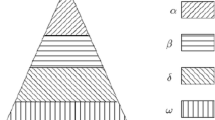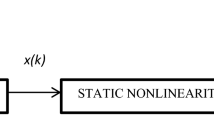Abstract
This paper presents a unified method for reduced-order modelling of higher-order discrete-time systems in the complex delta domain. The approach is unified in the sense that it is fundamentally discrete time, but at a high sampling frequency converges to its continuous-time counterpart. New hybrid algorithms with a blend of grey wolf optimizer (GWO) and chaotic firefly algorithm (CFA) using iterative chaotic map have been proposed for the order reduction of large-scale systems in the delta domain. GWO explores the entire search domain while CFA carries out local search in the proposed hybrid technique with different tuning parameters of FA improvised by one-dimensional iterative map, thus improving the convergence speed and the quality of the solutions. Two examples of single-input single-output systems are taken up to establish the usefulness of the proposed method. The hybrid approach not only yields good matching in the delta domain, but also delivers quality solutions (minimum fitness value) and provides faster convergence speed than the existing techniques. The performances of the reduced systems are also compared with their respective original systems as well as reduced systems reported in the literature in terms of time-domain and frequency-domain parameters. The proposed topology also proved its superiority in terms of some benchmark error indices well established in the literature of systems approach and control.



Similar content being viewed by others
References
Abu-Al-Nadi DI, Alsmadi OM, Abo-Hammour ZS, Hawa MF, Rahhal JS (2013) Invasive weed optimization for model order reduction of linear MIMO systems. Appl Math Model 37(6):4570–4577
Bansal JC, Sharma H (2012) Cognitive learning in differential evolution and its application to model order reduction problem for single-input single-output systems. Memet Comput https://doi.org/10.1007/s12293-012-0089-8
Biradar S, Hote YV, Saxena S (2016) Reduced-order modeling of linear time invariant systems using big bang big crunch optimization and time moment matching method. Appl Math Model 40(15):7225–7244
de Moura Oliveira PB, Freire H, Pires ES (2016) Grey wolf optimization for PID controller design with prescribed robustness margins. Soft Comput 20(11):4243–4255
Derrac J, García S, Molina D, Herrera F (2011) A practical tutorial on the use of nonparametric statistical tests as a methodology for comparing evolutionary and swarm intelligence algorithms. Swarm Evol Comput 1(1):3–18
Emary E, Zawbaa HM, Hassanien AE (2016) Binary grey wolf optimization approaches for feature selection. Neurocomputing 172:371–381
Eslami M, Shareef H, Khajehzadeh M (2013) Firefly algorithm and pattern search hybridized for global optimization. In: International conference on intelligent computing. Springer, Berlin, Heidelberg, pp 172–178. https://doi.org/10.1007/978-3-642-39482-9_20
Fortuna L, Nunnari G, Gallo A (1992) Model order reduction techniques with applications in electrical engineering. Springer, London
Gandomi AH, Yang XS, Talatahari S, Alavi AH (2013) Firefly algorithm with chaos. Commun Nonlinear Sci Numer Simul 18(1):89–98
Ganji V, Mangipudi S, Manyala R (2017) A novel model order reduction technique for linear continuous-time systems using PSO-DV algorithm. J Control Autom Electr Syst 28(1):68–77
Jayabarathi T, Raghunathan T, Adarsh BR, Suganthan PN (2016) Economic dispatch using hybrid grey wolf optimizer. Energy 111:630–641
Kamboj VK (2016) A novel hybrid PSO-GWO approach for unit commitment problem. Neural Comput Appl 27(6):1643–1655
Kamboj VK, Bath SK, Dhillon JS (2016) Solution of non-convex economic load dispatch problem using Grey Wolf Optimizer. Neural Comput Appl 27(5):1301–1316
Luo Q, Zhang S, Li Z, Zhou Y (2015) A novel complex-valued encoding grey wolf optimization algorithm. Algorithms 9(1):1–23. https://doi.org/10.3390/a9010004
May RM (1976) Simple mathematical models with very complicated dynamics. Nature 261(5560):459–467
Middleton RH, Goodwin GC (1990) Digital control and estimation: a unified approach. Prentice Hall information and system sciences series. Prentice Hall, Englewood Cliffs
Mirjalili S (2015) How effective is the Grey Wolf optimizer in training multi-layer perceptrons. Appl Intell 43(1):150–161
Mirjalili S, Mirjalili SM, Lewis A (2014) Grey wolf optimizer. Adv Eng Softw 69:46–61
Mishra R, Das KN (2016) Chemo-inspired genetic algorithm and application to model order reduction problem. In: Proceedings of fifth international conference on soft computing for problem solving 2016. Springer, Singapore, pp 31–41. https://doi.org/10.1007/978-981-10-0448-3_3
Mukherjee S, Mittal RC (2005) Order reduction of linear discrete systems using a genetic algorithm. Appl Math Model 29(6):565–578
Narwal A, Prasad R (2017) Optimization of LTI systems using modified clustering algorithm. IETE Tech Rev 34(2):201–213
Rizk-Allah RM, Zaki EM, El-Sawy AA (2013) Hybridizing ant colony optimization with firefly algorithm for unconstrained optimization problems. Appl Math Comput 224:473–483
Saremi S, Mirjalili SZ, Mirjalili SM (2015) Evolutionary population dynamics and grey wolf optimizer. Neural Comput Appl 26(5):1257–1263
Sharma H, Bansal JC, Arya KV (2012) Fitness based differential evolution. Memet Comput 4(4):303–316
Sikander A, Prasad R (2015a) Linear time-invariant system reduction using a mixed methods approach. Appl Math Model 39(16):4848–4858
Sikander A, Prasad R (2015b) Soft computing approach for model order reduction of linear time invariant systems. Circuits Syst Signal Process 34(11):3471–3487
Sikander AA, Prasad BR (2015c) A novel order reduction method using cuckoo search algorithm. IETE J Res 61(2):83–90
Sikander A, Prasad R (2017a) A new technique for reduced-order modelling of linear time-invariant system. IETE J Res 63(3):316–324
Sikander A, Prasad R (2017b) New technique for system simplification using Cuckoo search and ESA. Sādhanā. 42(9):1453–1458
Sikander A, Thakur P (2017) Reduced order modelling of linear time-invariant system using modified cuckoo search algorithm. Soft Comput. https://doi.org/10.1007/s00500-017-2589-4
Skogestad S, Postlethwaite I (2007) Multivariable feedback control: analysis and design. Wiley, New York
Soloklo HN, Farsangi MM (2013) Multi-objective weighted sum approach model reduction by Routh–Pade approximation using harmony search. Turk J Electr Eng Comput Sci 21(Sup.2):2283–2293. https://doi.org/10.3906/elk-1112-31
Tawhid MA, Ali AF (2017) A hybrid grey wolf optimizer and genetic algorithm for minimizing potential energy function. Memet Comput 9(4):347–359
Yang XS (2010) Firefly algorithm, stochastic test functions and design optimisation. Int J Bio Inspir Comput 2(2):78–84
Author information
Authors and Affiliations
Corresponding author
Ethics declarations
Conflict of interest
The authors declare that they have no conflict of interest and this work has not been supported by any funding agency.
Additional information
Communicated by V. Loia.
Rights and permissions
About this article
Cite this article
Ganguli, S., Kaur, G. & Sarkar, P. A hybrid intelligent technique for model order reduction in the delta domain: a unified approach. Soft Comput 23, 4801–4814 (2019). https://doi.org/10.1007/s00500-018-3137-6
Published:
Issue Date:
DOI: https://doi.org/10.1007/s00500-018-3137-6




